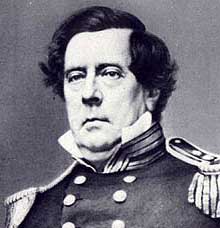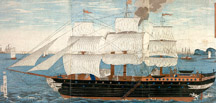![]() Commodore Perry and the Opening of Japan
Commodore Perry and the Opening of Japan

For two centuries, Japan was closed to all but a few Dutch and Chinese traders. The United States hoped Japan would agree to open certain ports so American vessels could begin to trade with the mysterious island kingdom. On July 8,1853, four black ships led by USS Powhatan and commanded by Commodore Matthew Perry, anchored at Edo (Tokyo)Bay. Never before had the Japanese seen ships steaming with smoke.

Commodore Matthew Perry brought a letter from the President of the United States, Millard Fillmore, to the Emperor of Japan. The Japanese government realized that their country was in no position to defend itself against a foreign power, and Japan could not retain its isolation policy without risking war. On March 31, 1854, after weeks of long and tiresome talks, Perry received what he had so dearly worked for a treaty with Japan, peace and friendship between the United States and Japan.
![]() ぶんぽう Grammar
ぶんぽう Grammar
The grammatical function of nouns is indicated by particles. Their role is similar to English preposition, but the particle is attached at the end of noun.
Particle は is topic marker.
Particle が is subject marker.
Particle か is question marker.
Particle の is “of” “’s” “in”.
Some verbs take a direct object. Particleをis used to indicate the direct object of the sentence.
まいにち ごはんを たべます。I eat rice everyday.
テニスを します。I play tennis.
Some verbs take an indirect object. The particle にis
used to indicate the indirect object of the sentence.
トムさんは おとうさんに てがみを かきます。Tom writes a letter to his father.
わたしは ともだちに でんわを します。I called my friend.
The particle と means “and” and “together”
わたしとともだちは レストランに いきました。My friend and I went to a restaurant.
わたしは やまださんと レストランに いきました。 I went to a restaurant with Mr. Yamada.
After a specific time, the particle に (at,
in, on) is used. When the time word is not specific, for example “today”
“this week”, no particle is used.
ろくじに おきます。I get up at six o’clock.
きのう おちゃをのみませんでした。I didn’t drink tea yesterday.
The Particle で (at, in, on) is used
after the location of action.
としょかんで べんきょうします。I study in the library.
マクドナルドで ハンバーガーを たべます。I eat hamburgers at Mc Donald’s.
Particle でalso indicates “means (transportation,
tools, media, language, etc.)”
にほんごで はなしました。We spoke in Japanese.
がっこうに バスで きます。I come to school by bus.
![]() Vocabulary Practice: たんごをつかって、れんしゅうしましょう。
Vocabulary Practice: たんごをつかって、れんしゅうしましょう。
Let’s use the newly learned vocabulary and practice. Answer the following questions. Click each word to see if you are correct.
| なんじに おきますか。 | ごぜんろくじに おきます。 (午前六時に 起きます。) |
| だれと あさごはんを たべますか。 | かぞくと あさごはんを たべます。 (家族と 朝ご飯を 食べます。) |
| なにを たべますか。 | シリアルをたべます。 (シリアルを食べます。) |
| ブラシがありますか。 | ブラシがあります。 |
| どこで ひるごはんを たべましたか。 | カフェテリアで たべました。 (カフェテリアで食べました。) |
| なにで かみを とかしますか。 | ブラシで かみを とかします。 (ブラシで 髪を とかします。) |
![]() Flashcards
Flashcards
Click Flashcards to practice this unit's vocabulary or click the button below.
Here is a print version of this actvity. You will still need to use the online version to hear any audio.
Flashcards

![]() Graded Assignments
Graded Assignments
Please return to the Section 3 Tasks & Assignments folder to complete the graded assignments for Section 3, Part C.

